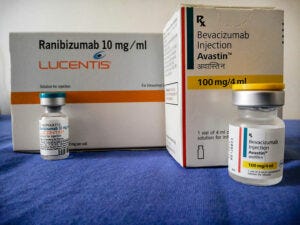
Both Johnson & Johnson and Roche are feeling pressure from biosimilars as sales of blockbuster products such as Remicade (infliximab) and Lucentis (ranibizumab) drop in Q3.
J&J’s immunosuppressive monoclonal antibody Remicade has seen biosimilar competition in the US since 2016 when Pfizer’s Inflectra won approval. But while a series of pricing measures and a lack of challenge from interchangeable products have kept J&J from seeing a total sales wipe-out, the firm continues to see its infliximab revenues erode.
For the third quarter 2022, J&J reported Remicade sales of $558 million worldwide, a 26.6% fall on the same period last year and a far cry from the $1.78 billion seen in the third quarter 2016. Within the US, sales for the period dropped 27% to $350 million.

Image: Flickr/Wanjiku Mathenge
J&J’s one-time top-seller has been overtaken by immunology monoclonal antibody Stelara (ustekinumab). The part quarter saw sales up 3% on last year, with the drug pulling in $2.5 billion worldwide – $1.66 billion of which came from the US. However, the main patent for Stelara expires in September 2023 in the US, and companies including Amgen, Formycon, and Alvotech are hoping their biosimilar candidates can take a significant slice of the market share.
Jennifer Taubert, EVP, and worldwide chairman of Pharmaceuticals at J&J, told investors the firm anticipates loss of Stelara earnings from late September 2023 but said “we believe that we’ve got a lot of tailwinds with our existing portfolio and our new launches to continue to have another year of above-market growth in 2023.”
Also reporting its first nine months 2022 earnings, Swiss giant Roche attributed its slightly decreases year-on-year pharma revenues – CHF 33.2 billion ($33.2 billion) vs CHF 33.4 billion in 2021 – on lower sales of products including Avastin (bevacizumab), Herceptin (trastuzumab), MabThera/Rituxan (rituximab), and Lucentis.
The first four of these blockbusters have felt biosimilar pressure for a number of years both in the US and for the first nine months have seen drops in sales of between 20% and 36% on the same period 2021.
The firm also saw a 25% drop in Lucentis sales to CHF 800 million. The wet age-related macular degeneration (wAMD) monoclonal antibody is new to biosimilar competition, with the first biosimilar version – Coherus’ Cimerli – coming to market in the US at the beginning of the third quarter. (Novartis owns the commercial rights to Lucentis outside of the US).
About the Author
You May Also Like

schedl_b_and_w.jpg?width=100&auto=webp&quality=80&disable=upscale)
schedl_b_and_w.jpg?width=400&auto=webp&quality=80&disable=upscale)


